
Check the health of your devices with a Warrant of Fitness
Just as you would with your car, your computer deserves regular maintenance too. In fact, at Geeks on Wheels, we recommend getting a computer Warrant of Fitness annually. This is because otherwise, some issues with your computer health might go unnoticed until they become serious problems.

Checking Temperatures
When your computer is running hot, the hardware in your computer can overheat and lead to potential failure. High temperatures can also cause performance errors and significantly slow your computer. We can detect an overheating computer, hopefully, before it causes any real damage. Commonly, high temperatures are caused by dust build-up on the fans or air vents, so a simple fix is for us to give the internals of your computer a good clean!
Checking Hard disk drives/solid state drives

Your computer will either utilise a hard disk drive (HDD) or a solid-state drive (SSD) for data storage. If the health of either of these data storage devices is poor, your computer can experience a number of errors. For example, files could become corrupt, and you could unwillingly lose data. That’s why we include a thorough check of your HDD or SSD as part of our WOF service. Because the quicker we pinpoint an issue, the easier it is to recover lost files!
Running scans
We can run a number of different scans to try and improve the performance of your computer. These scans will check for things such as corrupt files, broken registry files, viruses and unnecessary files, all of which can contribute to a badly performing computer. If identified, we can repair some of these corrupt or broken files, eliminate threats from viruses and delete unnecessary files to make space on your computer. And hopefully, with all of these fixes your computer should be running more smoothly.
Overall, as part of our Computer Warrant of Fitness service, we can help with:
- Checking your PC’s health (HDD/SDD, temperatures and battery health of laptops).
- Checking backups.
- Updating your PC.
- Checking AV/Internet security (Virus check).
- Running scans to try improve the performance of your PC.
Book Your Computer Warrant of Fitness Today
"*" indicates required fields
